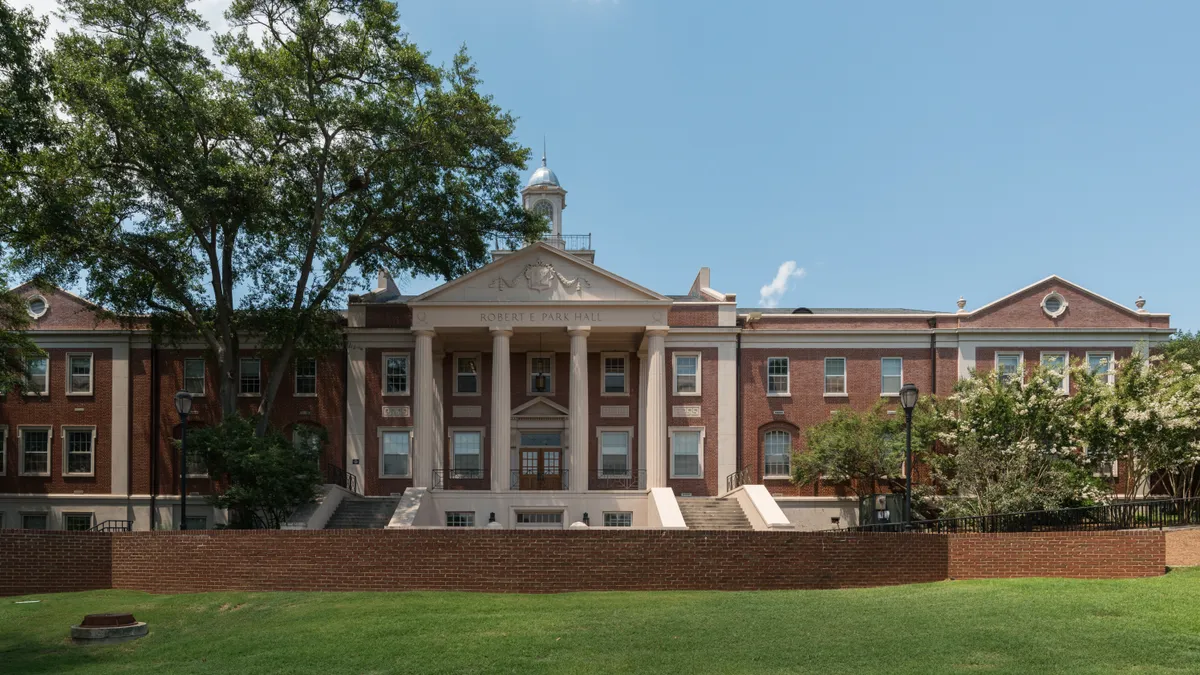Dive Brief:
- The University System of Georgia's governing board is considering changes to its tenure procedures, including a proposal that would allow the regents to reclaim control of tenure approval from campus presidents.
- Another change spells out the consequences faculty could face — including loss of tenure and termination — if they don't improve an unsatisfactory performance after a post-tenure review.
- The system's governing board is expected to vote on the changes in October. The proposal says the changes are meant to support faculty career development while also ensuring "accountability and continued strong performance" from them after they've received tenure.
Dive Insight:
The proposal comes at a time when tenure processes are in the public eye after Pulitzer Prize-winning journalist Nikole Hannah-Jones walked away from the University of North Carolina at Chapel Hill after a tenure battle tainted by politics. In Georgia, it also comes as faculty members push the system's regents for stronger coronavirus safety measures.
Matthew Boedy, president of American Association of University Professors' Georgia conference, described the proposal as an attack on the tenure system and is hoping the board can be convinced to water down the language. He noted that the AAUP believes periodic formal evaluation of tenured professors doesn't have much value.
Former system Chancellor Steve Wrigley announced a working group in September 2020 to evaluate the post-tenure review policies on campuses to "ensure all faculty remain productive throughout their careers." The committee released a report in June, which included recommendations to improve the process, some of which the board is now considering.
According to the new language, professors with substandard performance would undergo an improvement plan. If they don't make sufficient progress, then their institution could take remedial action against them, including suspending their pay, removing their tenure status or terminating them.
AAUP also recommends that such reviews be aimed at developing faculty rather than evaluating whether to dismiss them. But the new language says these reviews could lead to tenure revocations, Boedy said. "That is the most tragic irony of this," he said. "Post-review is a waste of time because it is a second judgment of tenure."
Proposed changes also say that faculty members could be fired during the post-tenure review process for reasons other than what the systems lists as grounds for removal. Another policy proposal also says the board could reclaim the authority to approve tenure decisions from institutions if their review processes were deemed "insufficiently rigorous." The system's governing board delegated tenure decisions to campus presidents in 2007.
"I think it's sending a clear signal to the universities that they don't think their standards are rigorous enough," Boedy said.
The plan also suggests evaluating faculty members on their student success activities, in addition to instruction, research and scholarship, and service. "Student success remains a top priority for the university system, and this process intends to strengthen that commitment among faculty throughout their career, including after they attain tenure," a system spokesperson said in a statement.
Some faculty members are withholding judgment on the proposal until they know how the system will carry it out, The Augusta Chronicle reported.
Context matters when evaluating the policy changes, said Brendan Cantwell, a higher education professor at Michigan State University.
On the one hand, governing boards largely control tenure approvals already, even though they rarely choose to ignore tenure committee recommendations. But the proposal could be used to "strip faculty decision-making away from particular campuses," Cantwell said.
"It's one of those things where it really matters how it's used by the board," he added.
The changes to post-faculty reviews follow a similar logic. While they could strengthen accountability by ensuring tenured faculty members are living up to their institutions' expectations, they could also become a way to police employees over their ideologies.
It's hard to root out what could pose a threat to academic freedom, Cantwell said.
"You don't want to set off the alarm bell every time there is a bylaws change," he said. "On the other hand, you have to be vigilant and you have to pay attention because, in a political environment, there are parties and actors who are looking to, in my view, harm higher education.















